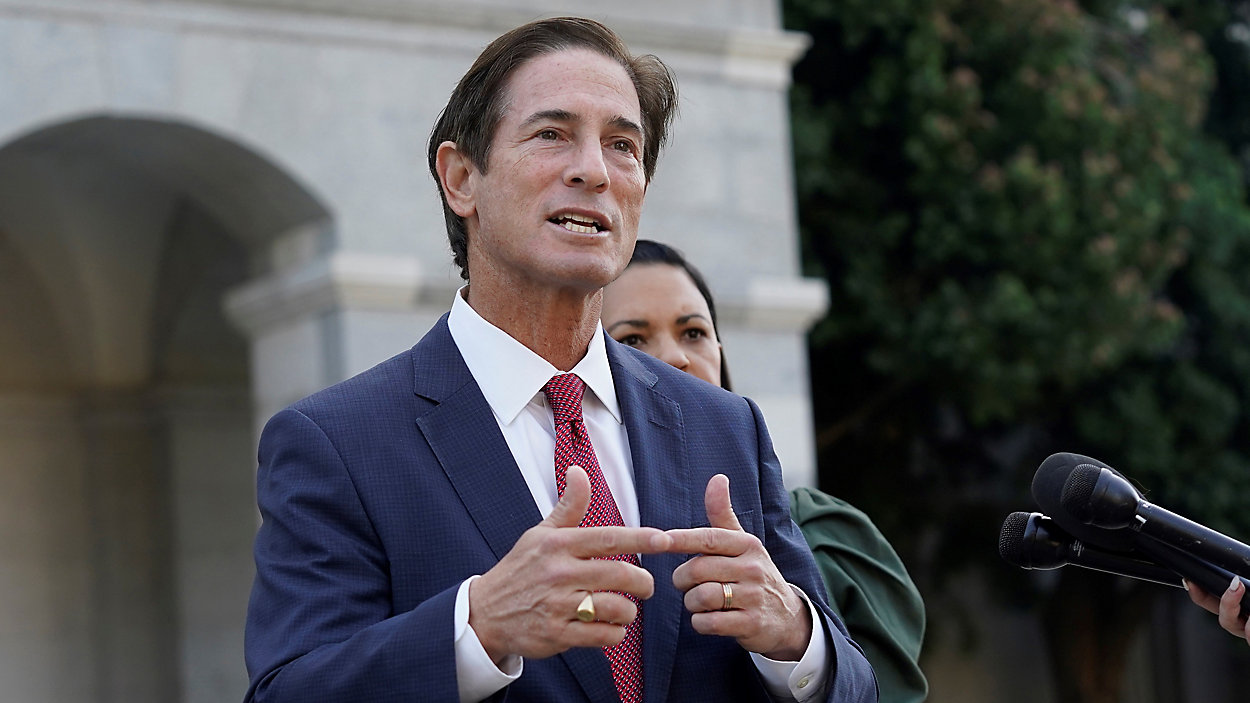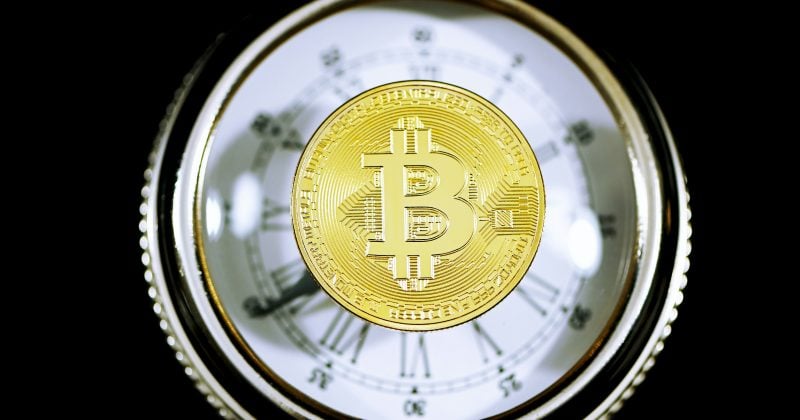As we moved through the fourth month of the Donald Trump presidency, chaos seems to be the situation for the economy. The recent announcement that the GDP had shrunk slightly has spooked the markets, as the up-and-down nature of Trump’s tariff policies has created what Robert Higgs has called “regime uncertainty,” which is bad news for anyone who had hoped that Trump would undo at least some of the economic damage caused by the Joe Biden administration.
Ever since the first Franklin Roosevelt administration launched its “First 100 Days” initiative in 1933, many presidents since then have sought to meet that dubious standard. Given that FDR’s famed 100 Days consisted of unprecedented transferral of power from Congress to the executive branch—with disastrous laws such as the Agricultural Adjustment Act and the National Industrial Recovery Act being passed during that time—the Roosevelt administration spent its time damaging the economy and the nation’s body politic. Nonetheless, the media and other pundits tend to judge an incoming administration by its first 100 days.
By any conventional measurement, Trump’s first 100 days have been tumultuous. This page—as it should—has taken a hard line against the implementation of the new tariffs and there is no backtracking from that criticism, even as many of Trump’s supporters have angrily reacted to the criticism. Furthermore, even Trump has thrown cold water on economic expectations with his recent “two dolls” comments regarding how his tariffs have driven up prices for some goods.
But Trump and his supporters claim that his economic regime of tariffs will have a “pain first, gain later” effect, something we have also dealt with on this page. What Trump has not explained, however, is how his policies will affect the longer-term capital development that any growing economy desperately needs. In fact, the Higgs “regime uncertainty” thesis has something to say about this situation, one that the president and his advisors would do well to heed. (Given the arrogance about economic matters that has come from the Trump White House so far, one doubts anyone there will listen to Higgs or anyone else who disagrees with them).
What Is “Regime Uncertainty” and Why Does It Matter?
In his 1997 paper “Regime Uncertainty,” economist Robert Higgs wrote that the combination of anti-business policies and hostile anti-business rhetoric from the Roosevelt White House during the 1930s contributed to the reluctance of businessmen to make long-term capital investments. Wrote Higgs:
The hypothesis [of “regime uncertainty”] is a variant of an old idea: the willingness of businesspeople to invest requires a sufficiently healthy state of “business confidence,” and the Second New Deal ravaged the requisite confidence (Krooss 1970, 199–201; Collins 1981, 23–52; Fearon 1987, 209–11; Brinkley 1995, 31–34). Of course, one difficulty with the hypothesis is that business confidence is a vague notion and one for which no conventional empirical measure has been developed. I shall try to narrow the concept somewhat and to show that one can shed empirical light on it by using the findings of systematic opinion surveys and evidence on the behavior of investors in the financial markets.
To narrow the concept of business confidence, I adopt the interpretation that businesspeople may be more or less “uncertain about the regime,” by which I mean, distressed that investors’ private property rights in their capital and the income it yields will be attenuated further by government action.
As Higgs points out, business owners during the 1930s didn’t know what was going to come out of the Roosevelt regime, especially in the second half of the 1930s when the administration firmly stood behind punitive measures against the business community. Higgs writes:
Accepting his party’s nomination for the presidency in 1936, Roosevelt railed against the “economic royalists” allegedly seeking a “new industrial dictatorship” (quoted in Leuchtenburg 1963, 183–84). Privately he opined that “businessmen as a class were stupid, that newspapers were just as bad; nothing would win more votes than to have the press and the business community aligned against him” (Leuchtenburg 1963, 183). Just before the election of 1936, in an address at Madison Square Garden, he fulminated against the magnates of “organized money…[who were] unanimous in their hate for me” and declared, “I welcome their hatred.” To uproarious applause, he threatened: “I should like to have it said of my second Administration that in it these forces met their master” (quoted in Leuchtenburg 1963, 184).
And it was more than just the rhetoric that dampened business investment. Higgs writes that the passage of punishing taxes and empowering of labor union organization of much of the manufacturing sector took its toll:
In the starkest demonstration of their new power, unionists began sit-down strikes, occupying employers’ facilities and refusing either to work or to leave until their demands were met. President Roosevelt declined to use force to eject the sit-down strikers; likewise, many state and local officials would not enforce the law against this willful trespassing on private property. As historian William E. Leuchtenburg (1963) observed, “Property-minded citizens were scared by the seizure of factories, incensed when strikers interfered with the mails, vexed by the intimidation of nonunionists, and alarmed by flying squadrons of workers who marched, or threatened to march, from city to city” (242).
Trump as a New New Dealer
While FDR didn’t spark a trade war, nonetheless his rhetoric and legislative measures—along with his executive orders—shifted the ground for business investment. Many of Trump’s measures since he took office in January are having similar effects, especially in capital development.
As I noted in an earlier article, given the unpredictability of Trump’s behavior in general and his tariff policies in particular, few business owners are going to make the long-term capital investment that would be needed to expand production of manufactured goods here. The reason is that most private business investment is already undertaken in an atmosphere of uncertainty. Writes Peter Klein:
I usually describe my approach here as the “judgment-based view” of entrepreneurship (see Foss and Klein, 2015, for a summary and reflections). The term judgment comes from Knight, who described judgment as decision-making under uncertainty that cannot be modeled or parameterized as a set of formal decision rules. Judgment is midway between the “rational decision-making” of neoclassical economics models and blind luck or random guessing. We sometimes call it intuition, gut feeling, or understanding.
However, many things can change the valuation of factors of production, and government policies such as tariffs, business taxes, or changes in the regulatory regime can create new opportunities for some but also have devastating consequences for other entrepreneurs. When government imposes potentially adverse conditions upon business enterprises, investments that might have been profitable before government acted now will suffer losses and have to abandon their plans.
While “New Deal” is a pejorative term in many business and economic circles, it seems that Trump is trying to push through government initiatives that are creating winners and losers and circumventing free markets. At the same time, his rhetoric has hardly been reassuring business owners and consumers who must bear the brunt of these initiatives, and especially the new (and ruinous) tariffs. Jeff Sommer writes in the New York Times:
Corporate America is stumbling in the dark, and so are investors.
Ford and General Motors executives say they can’t estimate what lies ahead. There’s too much fog even to hazard a guess, so both companies have suspended earnings guidance — signals about future sales and profits — leaving investors to navigate on their own. And the automakers are not the only ones. A broad range of companies, including Delta Air Lines, Southwest Airlines, the footwear company Skechers, UPS and the engine manufacturer Cummins, say they can’t talk confidently about the future.
This situation of uncertainty does not just affect current production decisions but also has an enormous impact upon future capital investment decisions these firms will make. Just as levels of private capital investment fell greatly during the 1930s, the same situation is likely to exist today, as firms are not going to jeopardize their future by investing billions of dollars in new lines of production only to have the president make a shoot-from-the-hip decision that renders the value of an investment to near-zero or even a loss.
Trump is trying to bring about structural changes both in government and in business. His recent executive order affecting the nation’s pharmaceutical industry, for example, can be read in many ways from a veiled threat to lower drug prices to politically-acceptable levels to creating an opening for new capital development. But given Trump’s record in his second administration, these drug firms most likely will pull into a defensive mode for a while to see what Trump actually does in the future, as opposed to making long-range investment plans.
Conclusion
While the US economy is not yet in a recession, Trump’s anti-business rhetoric, his arbitrary decisions, and his imposition of tariffs at ruinous levels are creating uncertainty within the business community. We have not seen this level of business uncertainty in 90 years, going back to the FDR administration.
Should the US economy suffer a recession, a recovery will depend upon new business investment, as firms move away from unprofitable lines of production and find new lines that are more promising. However, if Trump’s regime uncertainty continues, we could find ourselves in an economy that is stagnant and moving nowhere.



























